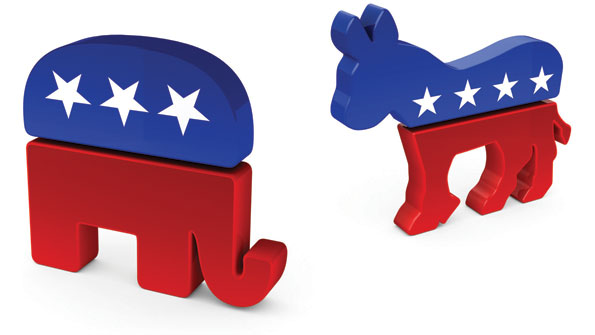More Republicans, fewer Democrats as county elected officials
The partisanship innate to the rancorous election season is increasingly being reflected at the local government level, too, although with less impact on how government operates. A national survey of county elected officials by the National Association of Counties (NACo) shows an increase in the number of those elected officials who identify with the Republican Party. Republican gains have come largely at a cost to Democrats, while the number of Independents has diminished only slightly, according to the 2012 survey.
The survey data reflects the changing face of local government, says Jacqueline Byers, NACo’s director of research and outreach. “Because of political ideologies, local officials take different approaches to how they address and resolve economic issues,” says Byers.
The gap between Republicans and Democrats has widened since 2004. In this year’s survey, 52 percent of county officials self-identified as Republicans, compared to 31 percent who identified themselves as Democrats. In previous presidential election years, 2004 and 2008, county officials self-identified at about 40 percent each for Democrats and Republicans.
Results from the current survey hint at how partisan differences affect local governing. For example, 76 percent of Republicans favor privatization of county services, compared to only 53 percent of Democrats and 64 percent of Independents.
A local official’s long-term outlook may also be influenced by partisan identification, the survey suggests. Some 51 percent of Republicans (compared to 41 percent of Democrats and 47 percent of Independents) think cutbacks in government resulting from the current downturn in the economy are permanent. In contrast, more Democrats think county government is likely to expand after the economy recovers. Most strikingly, 55 percent of Republicans (versus 39 percent of Independents and 22 percent of Democrats) think the cutbacks “should be permanent.”
However, a majority of survey respondents believe partisanship among county elected officials isn’t a problem. Only 3 percent of Republicans, 6 percent of Democrats and 6 percent of Independents say that partisan differences are a “major problem” while more than half of Republicans, Independents and Democrats alike say partisan differences are “no problem at all.”
Larry Anderson is a Georgia-based freelancer.





















A fair amount of movement in
A fair amount of movement in Michigan in the opposite direction yesterday. This is especially true in Lansing suburbs.
This subject of your article
This subject of your article is shamefully skewered if you do not look into how any redistricting (if any) has an effect of the number of Republicans and Democrats elected.